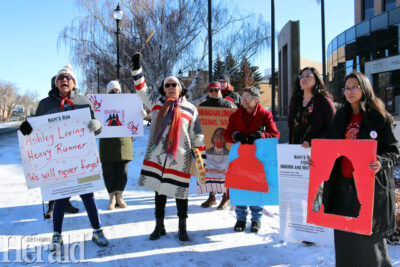March brings attention to missing and murdered women
By Lethbridge Herald on February 15, 2023.
 Herald photo by Alejandra Pulido-Guzman, singer leads a group gathered to honour the memory of Missing and Murdered Indigenous Women on Tuesday outside of City Hall.
Herald photo by Alejandra Pulido-Guzman, singer leads a group gathered to honour the memory of Missing and Murdered Indigenous Women on Tuesday outside of City Hall.Alejandra Pulido-Guzman
Lethbridge Herald
Members of the community gathered in front of City Hall Tuesday afternoon to bring awareness to the national tragedy of missing and murdered Women, Girls, 2SLGBTQIA+ people in Canada.
About a dozen people gathered with signs, drums, and their voices to take part of the Women’s Memorial March which originated in Vancouver in 1992 after many women’s bodies were discovered.
Community organizer Tseten Drawu said the women in that community finally had enough and they took to the streets and they marched.
“It was one after another, and nobody was speaking out for these women that were going missing and being murdered,” said Drawu.
She said the people that walked wanted to show that those missing and murdered matter.
“On Feb.14 they decided to do it on that day to bring out the caring, the compassionate side of all of this out of the sense of violence that was taking place,” said Drawu.
She said the walk has been taking place in Lethbridge for the last 16 years.
“The interesting thing is nothing has really changed,” said Drawu.
She said many families have asked for help when their family members go missing and they do not receive the attention they deserve, as it happened in our community last year.
“When they came out and they said ‘hey our family members are missing’ nobody was listening, they say ‘no they’re not’ and then sadly they found them a week later, and this happened in our community just within last year, nothing has changed,” said Drawu.
She said despite the lack of change, members of the community continue marching every year as a way to remember their loved ones, to grief and to heal together.
The City of Lethbridge in support of the community, placed several red flags outside of City Hall along Stafford Drive South, to symbolize those who have lost family members.
Indigenous relations advisor with the City of Lethbridge, Charlene Bruised Head-Mountain Horse said many City staff have contributed to this display.
“Indigenous relations of Lethbridge makes it a priority to commemorate and honour our indigenous people,” said Bruised Head-Mountain Horse.
She explained the display consist of red flags because for many previous vigils and women’s memorial marches and any action related to murdered and missing Indigenous women, red has always been the colour representative of that action.
“Many red dresses are hung, flags are flown, but that has been the primary colour symbolic of recognizing and commemorating those who we have lost,” said Bruised Head-Mountain Horse.
She said that for those looking to educate themselves, the City of Lethbridge has a Missing and Murdered Indigenous Women’s toolkit which is a collaborative document and resource for any member of the community to access.
“If you can make that connection with empathizing and understanding what many of the families are experiencing, the huge percentage of loss an unsolved indigenous women’s murder across Canada, then it might spark something in you to be compassionate, empathetic and also patient and understanding what much of the trauma that these families are experiencing,” said Bruised Head-Mountain Horse.
Follow @APulidoHerald on Twitter
22-21





It is very sad to see these preventable deaths which all begin right in the indigenous communities in their own homes. We have tried to show them, including the federal funded investigations that almost all stem from issues in on their communities. Do they want our help? NO! They refuse and instead try to make it our problem. Change to most of their issues will come when they accept the fact that they have to make changes in their own homes, their lifestyles, their way of living and take responsibility for their own actions. The devastation on our streets, for the most part, began with issues as this kids grew up in their homes in the indigenous communities.
Bad things happen in their own homes by relatives or family friends to these kids growing up that were not dealt with and once you end up on city streets there is a good chance you will be dead within 5-7 years. Many only make it months.
It all begins in your homes!
Unfortunately/fortunately you have stated the obvious.